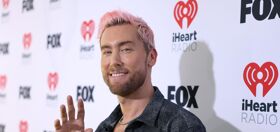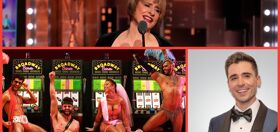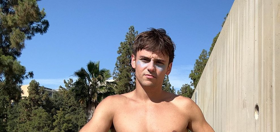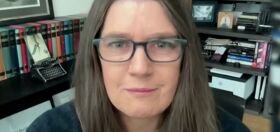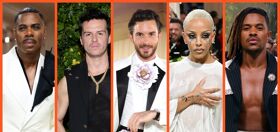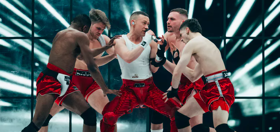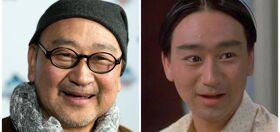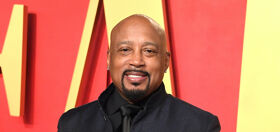
This article is part three of a series of interviews conducted at the Sundance Film Festival chronicling the best of indie film. Many of these films are still looking for distributors, and won’t be viewable anytime soon.
Hari Sama sounds a bit like a kid on Christmas morning: teeming with excitement and out of breath.
He greets me on the phone just ahead of a special screening of his latest film This is Not Berlin at Sundance. Set in Mexico City in the 1980s, it follows two teenage best friends, Carlos (Xabiani Ponce de Leon) and Gera (Jose Antonio Toledano) as they stumble into the underground club scene of radical queer artists, drugs, sex and rock music. Right away, the scene causes the two to begin asking questions about the nature of their friendship, and themselves.
Sama took a few minutes to speak with Queerty about the film and its themes of sexual exploration. (This is Not Berlin is currently seeking distribution, so you’ll have to wait to see this terrific film. Sorry.)
How about we take this to the next level?
Our newsletter is like a refreshing cocktail (or mocktail) of LGBTQ+ entertainment and pop culture, served up with a side of eye-candy.
This is a wonderful story, one I’ve not seen done before. What was the inception for you? I’m guessing this is autobiographical…
It is. That is absolutely true. It’s autobiographical. It’s basically my adolescence, my teenage years.
Wow.
Obviously, I had to change many elements to be able to put it in a screenplay. But they all come from the time I was growing up in Mexico City, very close to where we shot. My friends all went to that Catholic school, and at some point in my life I got thrown into a gay bar called The Nine; Le Neuf in French. The owner was French. Then I met all these people that are very closely related to the characters you see in the film. Some of those characters are actually inspired by friends I had during those years, some of which aren’t alive anymore. So, yeah, it’s pretty much inspired by things I actually saw. It’s funny: That garden where they exhibit all the art installations and paintings and sculptures and so forth—that’s the actual house that actually had those exhibits. All the pieces in the scene are either real or recreations of real pieces that actually were exhibited in those years in those exhibits.
So to be clear, did you film on location at the actual school as well?
Yeah, that school is there from the 80s. I didn’t go to that school, but my friends did. It’s a private Catholic school.
The film is set in the 1980s, and borrows tropes from 1980s comedies, like Weird Science or Sixteen Candles. It uses the same devices: characters steal a car. Characters go clubbing underage. Somebody falls in love with his best friend’s sister. The big difference is that it treats them as real problems, with seriousness. Was that something you were conscious of when you were writing?
No, actually. It’s very funny you bring that up. I remember those films from that time. Perhaps I’m fonder, maybe you know that episodic [series] Freaks and Geeks? It has that same quality in that they are all real people. They are all these youngsters growing up. Even though it was a dramedy, it had that quality of truthfulness. You could see their pain through very obscure moments. But it was truthful. Sometimes you have pain in relation to this that, if you look at them from a distance, they don’t seem as painful, but in the moment, they are. They’re life-changing, even.
So I was not aware of any of that, to tell you the truth.
I got grounded many times. It was a whole thing. We normally stole the cars of our parents, and then it became a whole issue. I was grounded forever. Things like that were all the time happening. We were all crazy.

The difference is that the comedies of the 80s ignored gay people, or made a joke of them. In your film, they’re treated with respect. Through most of the film, its unclear if Carlos and Gera are attracted to women, men, both or just the scene. How much does that reflect your own experience?
Let me explain: I’m not gay. When I arrived at this bar I was talking about, I was a very shy kid from the suburbs. I was very self-conscious and I suffered incredibly because it was so hard for me to approach girls…or anyone. But I got to this bar and I felt incredibly comfortable there. I started having family—a gay family. I became super confused. I really didn’t know what I was anymore. I started loving these people. I grew up with these crazy artists that were mostly gay and that treated me incredibly well. Every time I went to the bar there was a guy buying me drinks, and I felt incredibly comfortable there. It came to the point where I just wanted to be gay. I needed to be gay!
Wow.
So there’s no way I cannot treat that with respect. I love those guys. They were people I admired. They were older than me, obviously. And I admired them and they gave me the love I was not receiving anywhere else. So I really wanted to be gay to belong there. At some point, they started realizing. I mean, this was the 80s and things were very extreme. I started having sex with all these girls, and they started noticing. They were saying, “Oh my god, what’s going on here?” At some point, things got complicated. I stopped seeing [my gay friends]. I went to rehab. But I guess that’s where all the respect you talk about is coming from. To this day, many of my best friends are gay. I cherish that time of my life when I really wanted to be gay because I felt so incredibly comfortable.
This is a queer story, but it’s also not a queer story. You also play gay Uncle Esteban in the film. What made you want to play the role? Were you concerned about directing yourself?
I was very concerned about directing myself. I thought about it many times, and when I was growing up I had this uncle. He was crazy. He drank a lot. He used a lot of drugs. But he did show me the music. He gave me that—the 60s music. He was in love with all those crazy psychedelic bands from the 60s. I adopted that. At a certain point [I said], “I will never listen to music that was recorded past 1972.” Which was sort of weird, according to my friends.
Related: How ‘Halston’ director Frederic Tcheng uncovered the world of a lost queer hero
So I wrote my perfect uncle, the perfect male that I needed in my life and did not have. So it was inspirational for me to play that role so I could really give that to my boy that is still there somewhere. That was beautiful. I had my friend Max Zunino who co-wrote with me help me and watch my scenes. But I felt very, very comfortable playing that role. I was really excited to do it.

Your lead actors, Xabiani Ponce De Leon, who plays Carlos, and Jose Antonio Toledano, who plays Gera were inexperienced. Was that a choice?
No. I didn’t have anything deliberately done. I just looked for the right people. Jose Antonio appeared in the casting. Xabiani was suggested by my producers. Fortunately, I knew he came from the Disney world. But the truth is I found the right people. I looked for them, and I found them. Ximena [Romo] was incredible casting. She comes from a very different kind of film. Then Mauro [Sanchez], I had worked with him, and I said, “This guy is Nico.” When I found them, we really worked very, very hard. We worked for months before shooting doing a lot of very deep work. I tend to work in a therapeutic way where I really need to know where they are coming from and their scars so that we can see which of those scars work for a character. I talk to them very openly, like I’m talking to you right now, which was a very interesting process because coming out is not specifically gay. I think it’s human in the deeper sense of the word. It’s a life-long process. I think it’s great to be able to come out and say, “This is me.” In the end, that’s what the film is about.
I’m also curious. There is a lot of frank, frontal male and female nudity, some of which is staged in public areas, or in groups. I realize in the US we tend to be a bit uptight about nudity, but my mind was blown. How do you prepare your cast to do that?
You know what? The first scene we shot with the group of artists was the scene where they are naked on the street with those words written on them.
Words like “queer” and those really offensive words. They were like, “Oh my God.” Xabiani was in complete shock. We had shot the previous parts with the school and all of that. But when the time came when he needed to get nude and work with everyone else in that scene he was like, “Oh no, this is tough.” And it was a real street. But the magical things was that when they started doing it, shouting and all of that, they became super empowered. To feel all that power they were feeling, at some point they didn’t even want to wear their robes. I even wanted to go naked.
[Laughter]
It was so empowering, the whole thing. I think that’s the magic of coming out in the deeper sense we were talking about. It gives you that very well-understood sense of power.

Self-confidence?
Exactly. And I have to say that [scene], the idea came from Mauro, the actor who plays Nico who is gay. We did a lot of research and we had wonderful artists and art historians giving us a lot of history of contemporary art and radical artists groups. I wanted them to have their own voice. At a certain point, Mauro understood what he wanted to do as an artist, and he told me. He designed this performance, so it was double powerful. It was magical.
What did the neighbors think when they saw it?
That was great, man! We actually asked permission from the Mexican Film Commission. We never said there would be naked people. So we got permission to close the street. Then we closed the street, but they told us we had to open it periodically at some point. So we closed the street and then all these naked guys started shouting. The film commission guy was there, and his eyes started opening wide and he was saying, “Oh my God, what is this?” So eventually he said, “I’m not going to watch this. Just shoot quickly.”
So that was it.
This is Not Berlin is currently seeking distribution.




